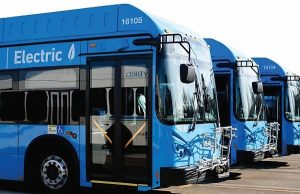By Cynthia Ezekwe
Oando Clean Energy Limited (OCEL), the renewable energy business subsidiary of Oando Energy Resources, a part of the Oando PLC group of companies, has partnered with with Yutong Bus Co Limited, world’s largest electric vehicle manufacturer, to deliver electric buses for Lagos mass transit, and boost sustainable transport system in the state.
The company disclosed this in a statement signed by Ayotola Jagun, OCEL’s chief compliance officer & company secretary, and published on the Nigerian Exchange (NGX) platform.
Prior to the partnership, OCEL signed a Memorandum of Understanding (MoU) with the Lagos Metropolitan Area Transport Authority (LAMATA) in 2022,to enable the successful deployment of an electric vehicle infrastructure ecosystem, which will include electric buses, charging stations, and other supporting infrastructure, towards the attainment of a sustainable road transport initiative in the state.
The MoU will also bridge the gap in the current mass transit bus system for the increasing number of Lagos commuters and make up a significant part of the State Government’s larger drive to improve mass transit infrastructure.
According to OCEL, the partnership with Yutong Bus Co Limited wincludes the production of electric buses equipped with air conditioning and Wi-Fi. In addition to the arrival of these electric buses, it noted that the renewable energy company has also taken delivery of the charging stations and spare parts necessary to ensure their effective operation.
The statement also noted that in line with the provisions of the partnership between OCEL and LAMATA, the receipt of both the buses and charging stations marks the commencement of its sustainable transport initiative, which is one of the company’s pipeline projects to support Nigeria in meeting her goal of net zero by 2060.
It further highlighted that the company’s strategic vision is to decarbonize the transport system in Nigeria and in the process, strengthen the socio-economic impact of transportation within the country, while noting that over the next seven years, and through the rollout of over 12,000 buses, this initiative will transition the current combustion mass transit buses to electric, starting in Lagos State and eventually across the country.
“In the medium to long term, and in line with our ambitions, our efforts within sustainable transport will lead to improved air quality, enhanced public health, enable the employment of at least 3,000 new drivers and an additional 2,000 workers to support bus maintenance, depot management, etc. as well as estimated economic cost savings of $2.6 billion, which is 3.6 per cent of Lagos Gross Domestic Product (GDP),’’ the statement added.
Notably, the company’s Electric Vehicle (EV) roll-out plan is strategically aligned with the Nigeria Energy Transition Plan (NETP); specifically supporting the government’s roadmap for EV implementation across Nigeria and its ambition to boost local capacity in the medium term through the construction of EV assembly plants.
The Oando -Yutong Joint Venture Partnership is set to boost the manufacture and deployment of additional electric buses during the Pilot and Rollout phases of the partnership with Lagos State through LAMATA; design and facilitate training programs targeted at the following critical stakeholders – bus drivers, bus operators, and regulators including but not limited to LAMATA and the ministry of transport; provide technical support and after-sales service; manage a supply chain network to support the availability of spare parts as and when required, and construct local EV assembly plant to boost indigenous capacity.
Commenting on the partnership, Frank Lee, managing director, Yutong West Africa described the development as a watershed moment for Yutong. He noted that it is the company’s first delivery of electric mass transit buses in sub-Saharan Africa and the first step in the large-scale deployment of an electric powered public road transport system in Nigeria.
“We are excited to be embarking on this journey in partnership with Oando, an organisation with a history of stellar performance in the energy sector and are hopeful to see a quick turnaround in our joint plans to advance all facets of the country’s transition to eco-friendly vehicles, including the development of local capacity through the delivery of, and exposure to extensive training programs for all stakeholders, from drivers to operators and the regulators,’’ Lee added.
Adewale Tinubu, chairman, OCEL, noted that audacity and innovation have always been key tenets in the company’s journey to transform Nigeria’s energy future, stating that the the arrival of the electric mass transit buses and development of an EV infrastructure ecosystem is a reminder that the only way to remain ahead of the curve is by being unafraid to break new ground and consistently looking for opportunities to leapfrog.
“The commencement of this project gives us a platform to showcase to other States what is possible and open the door for engagements on bespoke solutions to suit their local needs as well as act as a model to be adopted by other organisations looking to venture into sustainable transportation,’’ the chairman added.
In his remarks,Ainojie Irune, the president & CEO, OCEL, stated that the development of a sustainable transport ecosystem will positively impact the socio-economic indices surrounding transportation. He added that the EV infrastructure, built to facilitate optimal efficiency of the buses, will form the foundation of EV utilisation in Nigeria by providing charging stations, servicing, spare parts, skills development, and knowledge transfer.









